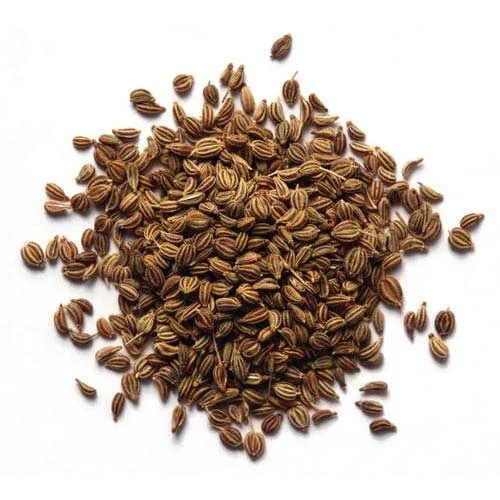Caroms
Info
- Shape : --
- Product Type : Whole
Trade Information
- Payment Terms: L/C (Letter Of Credit)/T/T (Bank Transfer)
- Supply Ability: 100 Tons Per Month
- Delivery Time: 1 Week
- Main Export Market(S): Global






| Specifications | Details |
|---|---|
| Calories | -- |
| Protein | -- |
| Fat | -- |
| Carbohydrates | -- |
| Fiber | -- |
| Sugar | -- |
| Sodium | -- |
| Vitamin C | -- |
Ajwain, also known as carom seeds or bishop's weed, is a spice commonly used in Indian cuisine. It is derived from the seeds of the Trachyspermum ammi plant, which is native to the eastern Mediterranean region and western Asia.
Ajwain seeds have a strong, pungent aroma and a slightly bitter, peppery taste. They resemble small caraway seeds and are often used as a spice in various dishes, as well as for their medicinal properties. Here are some common uses of ajwain in cooking:
Flavoring agent: Ajwain seeds are added to dishes to impart a distinct flavor and aroma. They have a unique, earthy taste that enhances the overall taste of curries, bread, snacks, and pickles.
Digestive aid: Ajwain is known for its digestive properties. It contains an essential oil called thymol, which helps stimulate the production of digestive enzymes, improve gut health, and relieve indigestion, flatulence, and bloating.
Ayurvedic remedy: In Ayurvedic medicine, ajwain is used for its various health benefits. It is believed to have carminative, antiseptic, and antimicrobial properties. It is often used to alleviate stomach ailments, respiratory issues, and menstrual discomfort.
Seasoning: Ajwain seeds are sometimes used as a topping or seasoning for bread, crackers, and snacks. They add a crunchy texture and a hint of flavor.
When using ajwain in cooking, it is common to dry roast the seeds before grinding or adding them to the dish. This process enhances their flavor and aroma. Ajwain can be used sparingly as it has a strong taste and can overpower other flavors if used in excess.
